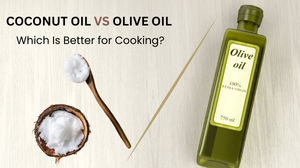Coconut Oil vs. Olive Oil: Which Is Better for Cooking
Cooking oils are essential components of any kitchen, and choosing the right one can significantly impact the flavor and health benefits of your meals. Among the myriad options available, coconut oil and olive oil are two of the most popular choices. Both offer unique benefits and uses, but which one is better for cooking? This article compares Coconut Oil and olive oil to help you make an informed decision for your culinary needs.
Understanding Coconut Oil
Coconut oil is derived from the meat of mature coconuts and is known for its distinctive flavor and numerous health benefits.
Key Benefits:
- High Smoke Point: With a smoke point of around 350°F (177°C), coconut oil is suitable for medium-heat cooking methods such as sautéing and baking.
- Rich in Saturated Fats: Coconut oil is high in medium-chain triglycerides (MCTs), which are easily digestible and can provide a quick source of energy.
- Antimicrobial Properties: The lauric acid in coconut oil has antimicrobial properties, which can help in maintaining gut health.
- Versatile Flavor: Its mild, slightly sweet flavor complements a variety of dishes, particularly in baking and tropical cuisines.
Understanding Olive Oil
Olive oil is extracted from olives and is a staple in Mediterranean diets, known for its rich flavor and health-promoting properties.
Key Benefits:
- High Smoke Point: Extra virgin olive oil has a lower smoke point (around 375°F or 190°C) compared to refined olive oils, which can reach up to 465°F (240°C). This makes it versatile for various cooking methods, including frying and roasting.
- Rich in Monounsaturated Fats: Olive oil is high in heart-healthy monounsaturated fats, which can help reduce bad cholesterol levels.
- Antioxidant Properties: Olive oil is rich in antioxidants like vitamin E and polyphenols, which have anti-inflammatory and heart-protective effects.
- Distinct Flavor: Its robust, peppery flavor enhances salads, pastas, and marinades, making it a favorite in many culinary traditions.
Comparing Coconut Oil and Olive Oil
When deciding between coconut oil and olive oil for cooking, consider the following factors: Also Read About How to Use Coconut Oil for Healthier Skin and Hair
1. Nutritional Profile
- Coconut Oil: High in saturated fats (about 90%), particularly MCTs, which can boost metabolism and energy levels. However, excessive intake of saturated fats can raise LDL cholesterol levels.
- Olive Oil: Rich in monounsaturated fats (about 73%), which are beneficial for heart health. Contains antioxidants that help fight inflammation and reduce the risk of chronic diseases.
2. Cooking Methods
- Coconut Oil: Suitable for medium-heat cooking like sautéing, baking, and stir-frying. Its stable structure prevents oxidation at high temperatures.
- Olive Oil: Extra virgin olive oil is ideal for low to medium-heat cooking and as a finishing oil. Refined olive oil, with its higher smoke point, can be used for frying and high-heat cooking.
3. Flavor Profile
- Coconut Oil: Imparts a mild, sweet, and slightly nutty flavor, making it perfect for desserts, curries, and tropical dishes.
- Olive Oil: Offers a rich, fruity, and sometimes peppery flavor, which enhances savory dishes like salads, pastas, and grilled vegetables.
4. Health Benefits
- Coconut Oil: The MCTs in coconut oil are quickly metabolized and can support weight loss and energy levels. Its antimicrobial properties support digestive health.
- Olive Oil: The high monounsaturated fat content and antioxidants in olive oil provide cardiovascular benefits, reducing the risk of heart disease and lowering inflammation.
Practical Uses in Cooking
Here are some practical ways to use coconut oil and olive oil in your cooking:
Coconut Oil:
- Baking: Substitute butter or other oils with coconut oil in baking recipes for a moist and flavorful result.
- Sautéing: Use coconut oil for sautéing vegetables, chicken, or shrimp for a mild, sweet flavor.
- Smoothies: Add a teaspoon of coconut oil to your smoothies for an extra energy boost and creamy texture.
Olive Oil:
- Salad Dressings: Whisk extra virgin olive oil with balsamic vinegar, lemon juice, and herbs for a healthy and delicious salad dressing.
- Roasting: Drizzle vegetables, chicken, or fish with olive oil before roasting to enhance flavor and promote even cooking.
- Dipping: Serve extra virgin olive oil with fresh bread, seasoned with herbs and spices, for a simple and tasty appetizer.
Conclusion
Both coconut oil and olive oil have their unique advantages and can be valuable additions to your cooking repertoire. Coconut oil is excellent for medium-heat cooking and baking, providing a distinct flavor and quick energy source. Olive oil, particularly extra virgin, is ideal for low to medium-heat cooking and as a finishing oil, offering heart-healthy fats and antioxidants.
Ultimately, the best choice depends on your specific cooking needs, flavor preferences, and health goals. Incorporating both oils into your diet can help you enjoy a variety of culinary experiences while reaping the health benefits each oil offers.
For more organic and high-quality oils, visit www.vitalyse.co and explore our range of products, including coconut oil, olive oil, rose water, pain relief oil, almond oil, castor oil, and black seed oil.


